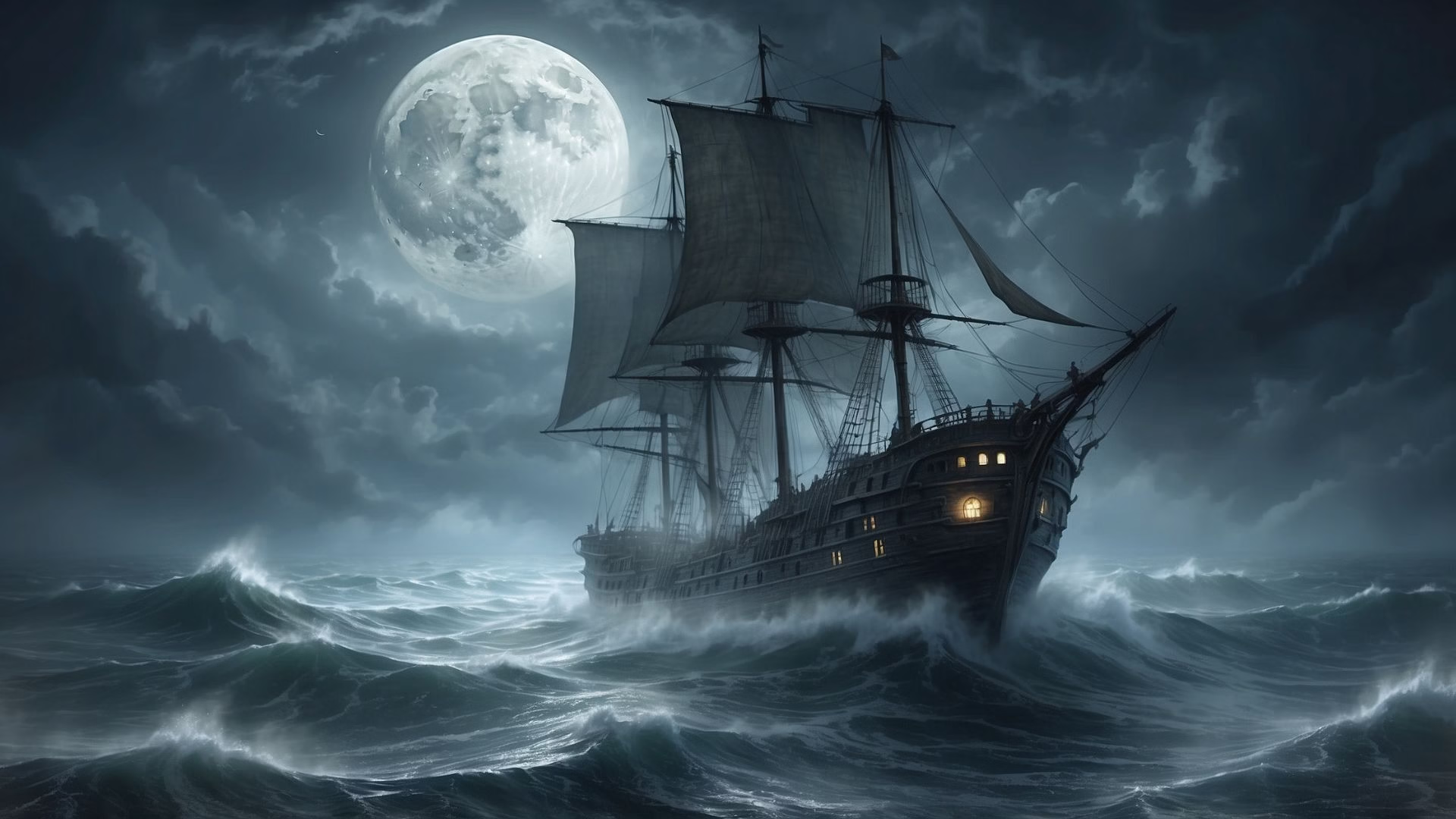Maritime folklore is filled with stories of ghost ships, cursed crews, and mysterious disappearances, but none are as famous as the legend of the Flying Dutchman. This eerie tale of a ghostly ship doomed to sail the seas forever has captivated sailors, writers, and storytellers for centuries. Let’s explore the origins, myths, and enduring legacy of the Flying Dutchman, a maritime legend like no other.
What Is the Flying Dutchman?
The Flying Dutchman is a legendary ghost ship said to haunt the oceans, particularly near the Cape of Good Hope at the southern tip of Africa. According to the myth, the ship and its crew are cursed to wander the seas for eternity, unable to make landfall. Sightings of the Flying Dutchman are often considered omens of doom or bad luck, especially for sailors braving dangerous waters.
The ship is typically described as glowing with a ghostly light, sailing against the wind, or appearing out of a thick fog. Some tales even claim that the crew attempts to communicate with passing ships, often to deliver messages to loved ones long since deceased.
The Origins of the Legend
The story of the Flying Dutchman likely originated in the 17th century, during the height of Dutch maritime exploration and trade. The legend is commonly associated with a Dutch ship captain, often named Hendrik van der Decken, who defied the elements and possibly even God in his quest to round the treacherous Cape of Good Hope.
As the story goes, van der Decken vowed to continue his journey despite a violent storm. Some versions suggest he cursed himself and his crew by swearing an oath to sail forever. Others depict him as a sinner who made a pact with the devil. Regardless of the version, the ship was condemned to roam the seas as a warning to others.
Sightings of the Flying Dutchman
Over the centuries, numerous sailors and even prominent figures have reported seeing the ghostly ship. One of the most famous sightings occurred in 1881 when Prince George of Wales, later King George V, reportedly witnessed the Flying Dutchman during a naval voyage near Australia. He described the ship as glowing with a red light and vanishing suddenly, leaving an eerie impression on the crew.
While many sightings can be attributed to optical illusions, such as mirages caused by atmospheric conditions, the mystery of the Flying Dutchman continues to fuel speculation and intrigue.
Symbolism and Themes
The Flying Dutchman embodies themes of eternal punishment, hubris, and the dangers of defying nature. In maritime culture, the legend serves as a cautionary tale about respecting the sea and its unpredictable power. It also reflects the fears and superstitions of sailors, who faced immense danger and isolation on long voyages.
The ship is often seen as a metaphor for being trapped by one’s mistakes or obsessions, unable to find peace or redemption. These universal themes give the legend its enduring appeal.
The Flying Dutchman in Popular Culture
The Flying Dutchman has transcended maritime folklore to become a cultural icon. It has inspired countless works of art, literature, music, and film. Highlights include:
- Richard Wagner’s Opera (1843): Wagner’s “The Flying Dutchman” tells the story of a cursed captain seeking redemption through the love of a faithful woman.
- Disney’s Pirates of the Caribbean: The ship and its captain, Davy Jones, play a central role in the film series, adding a supernatural twist to the legend.
- SpongeBob SquarePants: The Flying Dutchman is humorously reimagined as a ghostly character haunting Bikini Bottom.
These adaptations showcase the versatility of the legend, which can be interpreted as dark and ominous or playful and imaginative.
Scientific Explanations
While the Flying Dutchman is firmly rooted in folklore, some sightings may have scientific explanations. A phenomenon known as a superior mirage or Fata Morgana can create the illusion of a ship floating above the water or glowing with light. This optical illusion occurs when light bends due to temperature differences in the atmosphere, making distant objects appear distorted or displaced.
Such explanations don’t diminish the allure of the Flying Dutchman; instead, they add another layer to its mystique, blending science with storytelling.
Why the Legend Endures
The Flying Dutchman continues to captivate audiences because it taps into deep human fears and curiosities. It’s a story of defiance, punishment, and the unknown, themes that resonate across cultures and generations. The ship’s ghostly image reminds us of the vastness of the sea and the limits of human control.
Moreover, the legend serves as a testament to the power of storytelling. Passed down through oral traditions, adapted into various art forms, and reimagined for modern audiences, the Flying Dutchman proves that myths evolve while retaining their core essence.
The Flying Dutchman is more than just a ghost story—it’s a symbol of humanity’s relationship with the sea, blending fear, fascination, and respect. Whether seen as a cautionary tale, a supernatural phenomenon, or a creative inspiration, the legend holds a timeless place in maritime folklore and popular culture. The next time you hear tales of ghostly ships or feel the pull of the ocean’s mysteries, remember the Flying Dutchman and the enduring power of myth.
Let’s Talk
The Flying Dutchman is one of those stories that just sticks with you, doesn’t it? There’s something so haunting about a ghost ship doomed to sail the seas forever, but at the same time, it feels deeply human. After all, isn’t the idea of being trapped by your mistakes or obsessions something we can all relate to on some level? Maybe it’s not a ship, but haven’t we all had moments where we felt stuck in a loop, unable to move forward?
One thing that intrigues me about this legend is the role of the sea itself. The ocean is vast, mysterious, and often unforgiving—a perfect backdrop for a story like this. But it’s also a symbol of freedom and possibility, which makes the curse of the Flying Dutchman even more tragic. Imagine being surrounded by endless horizons yet unable to reach any of them. Do you think the story would be as compelling if it took place on land? There’s something about the unpredictability of the sea that adds to the legend’s power.
And then there’s the crew. In most versions of the tale, they’re as doomed as the captain. But here’s a thought: were they victims of his hubris, or did they share in his defiance? It’s a question of collective versus individual responsibility, and it’s one we still grapple with today. Think about teams or groups where one person’s actions affect everyone. How much blame or credit should be shared?
Speaking of modern connections, isn’t it interesting how the Flying Dutchman has been reimagined in so many ways? From Wagner’s opera to Pirates of the Caribbean to SpongeBob, the story has been adapted to suit different audiences and purposes. What does that say about its staying power? Maybe it’s the universal themes—fear of the unknown, the consequences of ambition, and the hope for redemption—that keep it relevant. Have you noticed how we keep retelling the same core stories, just in new settings and with updated characters? Why do you think that is?
And what about the sightings? Sure, science can explain a lot of them as mirages or optical illusions, but doesn’t part of you want to believe that the Flying Dutchman is real? Maybe not as a literal ghost ship, but as a reminder of the mysteries that still exist in the world. In an age where it feels like everything can be explained or Googled, there’s something comforting about a story that resists complete understanding. So, what do you think—should we try to explain every mystery, or is it better to let some things remain unknown?
Let’s Learn Vocabulary in Context
Let’s start with “maritime folklore.” This term refers to the body of myths, legends, and stories connected to the sea and sailors. You might use it like this: “Maritime folklore often reflects the fears and challenges of life at sea.” It’s a great way to sound knowledgeable when discussing ocean-related tales.
Next is “ghost ship.” This phrase describes a spectral or abandoned vessel, often tied to supernatural legends. You could say, “The old wreck looked like a ghost ship on the horizon.”
The word “eternity” is a key concept in the Flying Dutchman legend. It means forever or an unending amount of time. In a sentence: “Waiting for my flight felt like an eternity.”
“Hubris” is another important term. It means excessive pride or arrogance, often leading to downfall. You might use it in daily life like this: “His hubris made him underestimate the competition.”
“Cursed” ties directly to the story’s supernatural elements. It means being afflicted with misfortune or doom. In everyday use, you could say, “I feel cursed every time I try to bake cookies—they always burn.”
The term “sightings” refers to reported observations of something unusual or noteworthy. You might say, “There have been several sightings of unusual birds in the park lately.”
Let’s explore “omen.” An omen is a sign or event believed to predict the future, often something bad. In conversation, you might hear, “The dark clouds were an ominous omen before the storm.”
The word “redemption” plays a big role in many versions of the legend. It means being saved from sin or wrongdoing. You could use it metaphorically: “She found redemption in helping others after her mistake.”
“Optical illusion” is a scientific term often used to explain ghost ship sightings. It refers to something that tricks the eyes into seeing something that isn’t there. For example: “The reflection on the water created an optical illusion that looked like a bridge.”
Finally, “transcend” means to go beyond the ordinary or exceed limits. You might say, “Great art has the power to transcend time and culture.”
Now, think about this: which of these words do you think you could use in your own conversations? Have you ever felt cursed by a challenge or found redemption in something you achieved? And what modern “ghost ships” do you think still capture our imagination today?
Let’s Discuss & Write
Discussion Questions:
- Why do you think stories like the Flying Dutchman resonate with people across generations and cultures?
- Do you believe in the possibility of ghost ships or other supernatural maritime phenomena? Why or why not?
- What does the Flying Dutchman teach us about the dangers of ambition or hubris?
- How would the story change if it were set on land instead of at sea?
- What role do legends like the Flying Dutchman play in preserving maritime history and culture?
Writing Prompt:
Write a short story titled “A Modern Flying Dutchman” where you reimagine the legend in a contemporary setting. Perhaps it’s an abandoned spaceship drifting in space or a ghostly plane haunting the skies. Focus on creating a sense of mystery and tying in themes like hubris, redemption, or eternal wandering. Aim for 300–400 words, and try to incorporate at least three key vocabulary words from the topic to enrich your story.










0 Comments